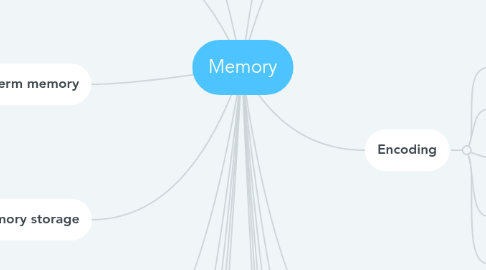
1. Working memory
1.1. A never understanding of short term
1.2. Memory that adds conscious active processing of incoming auditory and visual
2. Long term memory
2.1. The relatively permanent and limitless storehouse of the memory system.
2.2. Include knowledge, skills, and experiences.
3. Short term memory
3.1. Activated memory that holds a few items briefly before the information is stored or forgotten
4. Memory storage
4.1. Parricidal memory
4.1.1. Memory of highly practiced skills
4.2. Explict memory
4.2.1. Memory of fact and events that can retrieval
4.3. Conditioned response
4.3.1. Binaural or emotions that occur automatically as reacions to outside events as a result at past associon tons.
5. Déjà Vu
5.1. That eerie sense that you have experienced something before.
5.2. What is occurring is that the current situation cues past experiences that are very similar to the present one, you mind gets confused.
6. Proactive interference
6.1. Occurs when you are being tested on NEW information and old information interferes proper retrieval.
6.2. I know this seems reversed. To get this correct you must first ask yourself... "What is being tested?"
6.3. If the answer is NEW information the term you use is PROactive INterference
6.4. Psychologists have found that recall of later items can be improved by making them distinctive from early items.
7. Retroactive INterference
8. Memory is a construct
8.1. When we remember something, we're taking bits and pieces of experience - sometimes from different times and places - and bringing it all together to construct what might feel like a recollection but is actually a construction.
8.2. The process of calling it into conscious awareness can change it.
9. Autobiographical memory
9.1. Recollection of events in our life
9.2. More recent events are easier to recall
9.3. Hypethethymesia condition of possessing an extremely detailed autobiographical memory.
10. Storage
10.1. The retention of encoded material overtime
11. Retrieval
11.1. The process of getting the information out of memory storage
11.2. Recall
11.2.1. You must retrieve the information from your memory
11.2.1.1. Fill-in-the blank or essay tests
11.3. Recognition
11.3.1. You must identify the target form passible targets
11.3.1.1. Multiple-choice tests
11.4. Relearning
11.5. Retrieval Cues
11.5.1. Priming
11.5.1.1. To retrieve a specific memory from the web of associations, you must first activate one of the strands that leads to it. This process is called priming.
12. Encoding
12.1. The processing of information into the memory system
12.2. Unconscious encoding of very information such as space and time well learning
12.3. Parallel processing
12.3.1. The processing of many aspects of a problem at the same the brains natural made of information processing for many functions
12.4. Implicity memory
12.4.1. Retention of learned skills, or classically conditioned associations without conscious awareness
12.5. Explicit memory
12.5.1. Retention of facts and personal events your can consciously retrieve.
13. Context-Dependent Memory
13.1. It helps to put yourself back in the same context you experienced (encoded) something.
13.2. If you study on your favorite chair at home, you will probably score higher if you also took the test on the chair.
14. Mood Congruent Memory
14.1. Tendency to recall experiences that are
15. Amnesia
15.1. Anterograde Amnesia - you can recall the past but cannot form new memories
15.1.1. However H.M. and Jimmie could recall things they've learned through automative processing.
15.1.2. Most common for a short period of learning
